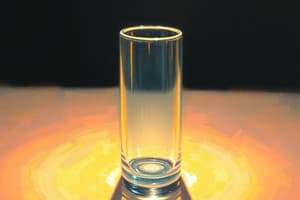Podcast
Questions and Answers
ما هو القانون الذي يفسر لماذا تنحني الضوء أكثر عندما يمر من الماء إلى الهواء مقارنة بالاتجاه الآخر؟
ما هو القانون الذي يفسر لماذا تنحني الضوء أكثر عندما يمر من الماء إلى الهواء مقارنة بالاتجاه الآخر؟
- قانون نيوتن للإضاءة
- قانون الحركة
- قانون الانعكاس
- قانون الانكسار (correct)
ما هي الاستخدامات الشائعة للعدسات في نظم التصوير؟
ما هي الاستخدامات الشائعة للعدسات في نظم التصوير؟
- عكس الضوء
- توليد طيف من الأطوال الموجية (correct)
- استخدامها في توليد الألوان
- استخدامها في قياس المسافات
ما هي وظيفة المرايا الانعكاسية في التلسكوبات؟
ما هي وظيفة المرايا الانعكاسية في التلسكوبات؟
- إعادة توجيه الضوء (correct)
- تحديد الاتجاهات الجغرافية
- تحديد مكان نجوم معينة
- إرسال الضوء إلى العدسة
ما هي وظيفة المرايا الثانوية في التلسكوبات؟
ما هي وظيفة المرايا الثانوية في التلسكوبات؟
ما هي إحدى التطبيقات التي يُستخدم فيها البريزم في التحليل؟
ما هي إحدى التطبيقات التي يُستخدم فيها البريزم في التحليل؟
ما هي وظيفة انعكاس الضوء من المرآة في تلسكوب كاسيغرين؟
ما هي وظيفة انعكاس الضوء من المرآة في تلسكوب كاسيغرين؟
ما هو السبب وراء تشتت ضوء الشمس عندما يدخل البريزم؟
ما هو السبب وراء تشتت ضوء الشمس عندما يدخل البريزم؟
كيف يعمل البريزم في فصل ألوان الضوء؟
كيف يعمل البريزم في فصل ألوان الضوء؟
ما هي وظيفة القاعدة في هيكل البريزم؟
ما هي وظيفة القاعدة في هيكل البريزم؟
لماذا يثني الضوء عند دخوله إلى وسط بطئ مثل البريزم؟
لماذا يثني الضوء عند دخوله إلى وسط بطئ مثل البريزم؟
ما هو قانون سنيل؟
ما هو قانون سنيل؟
ماذا يشير انكسار الضوء إلى؟
ماذا يشير انكسار الضوء إلى؟
Flashcards are hidden until you start studying
Study Notes
Prism is a term used in various contexts, often associated with refraction of light or imaging systems. Here's what you need to know:
What Is a Prism?
A prism is a transparent crystal or glass object that is commonly used to disperse light by separating it into its component colors. It has two opposing triangular faces known as bases, which are joined by five rectangular sides called lateral surfaces. Prisms come in many shapes and sizes, including triangular, square, rectangular, and even cylindrical.
How Does a Prism Work?
Prisms work through the process of refraction when light enters them. The angle of incidence determines how much the light is bent within the prism. This bending causes different wavelengths of light to separate out, creating a spectrum of colors from blue to red.
Refraction
Refraction is the change in direction of a wave due to a change in medium. When light travels between two media, such as air and water or air and a prism, it slows down because the speed of light changes. Light bends towards the normal (perpendicular) in the slower medium, explained by Snell's Law.
Snell's Law
Snell's Law states that the ratio of sines of angles of incidence and reflection is equal to the inverse ratio of velocities of waves in the respective medias. In mathematical terms, n1sin(i) = n2sin(r), where:
- i is the angle of incidence (measured from normal)
- r is the angle of refraction (also measured from normal)
- n1 is the refractive index of the first medium (n1 > n2 if the first medium is denser)
This law explains why light bends more when it goes from water to air than the other way around - the speed of light decreases in water compared to air.
Applications of Prisms
Optical Spectroscopy
In spectrometry, prisms are used to produce a spectrum of wavelengths based on absorption, transmission, or emission across a given wavelength range. By scanning these spectra, spectrometers can analyze the composition of gasses, liquids, and solids.
Imaging Systems
Large reflecting telescopes often have secondary mirrors mounted on a structure called a Cassegrain focus. A Cassegrain focus uses a combination of curved mirrors to redirect light. One mirror reflects light to the eyepiece, while another directs light through the hole in the center of the primary mirror, allowing both starlight and reflected light to exit the optical tube.
Lunar Laser Ranging
For lunar laser ranging (LLR), retroreflectors placed on the Moon serve as targets for ground-based lasers. These instruments detect photons reflected off the Moon, which allows scientists to measure the distance between Earth and the Moon with incredible precision.
Conclusion
From their role in scientific instruments to their appearances in art and architecture, prisms continue to fascinate us with their unique ability to reveal the rainbow of light.
Studying That Suits You
Use AI to generate personalized quizzes and flashcards to suit your learning preferences.




